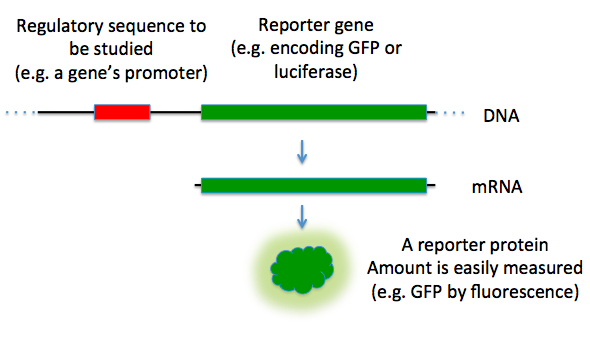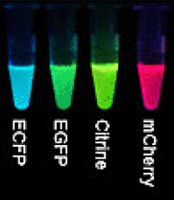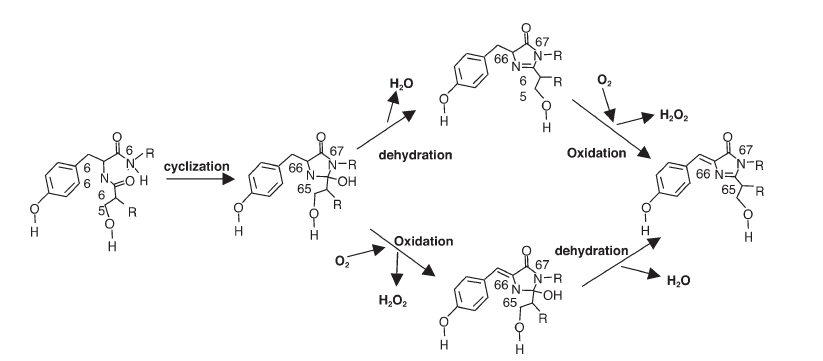Team:Evry/PromoterReporter
From 2012.igem.org
Chr.karine (Talk | contribs) |
|||
| (59 intermediate revisions not shown) | |||
| Line 4: | Line 4: | ||
---- | ---- | ||
| - | + | <br> | |
| + | <div id="div-14" style="float: left;"> | ||
| + | [[File:image-1_PR.png|400px]] | ||
| + | <br> | ||
| + | <center> | ||
| + | <span style="font-style:italic; font-size:10px;"> | ||
| + | <html> | ||
| + | Image source : <a href="http://en.wikipedia.org/wiki/File:Reporter_gene.png" target="_blank">http://en.wikipedia.org/wiki/File:Reporter_gene.png</a> | ||
| + | </html> | ||
| + | </span> | ||
| + | </center> | ||
| + | </div> | ||
| + | <div style="padding-left: 415px;"> | ||
| + | <br> | ||
| + | Reporter genes are used as a toolbox in molecular biology to do gene expression, promoter or transformation/transfection assays. A reporter gene, to be introduced into an organism, is placed with the gene of interest in the same DNA construct. A good reporter confers easily identifiable characteristics as selectable markers. | ||
| + | |||
| + | Our interest was to perform promoter’s assays to visualize where our promoters allow the gene expression in the tadpoles with fluorescent proteins. | ||
| + | <br><br><br><br><br><br><br><br><br> | ||
| + | </div> | ||
| + | |||
| + | |||
| + | |||
| + | <div id="div-15" style="float: left;"> | ||
[[File:image-2_PR.png]] | [[File:image-2_PR.png]] | ||
| + | <br> | ||
| + | <center> | ||
| + | <span style="font-style:italic; font-size:10px;"> | ||
| + | <html> | ||
| + | From : <a href="http://www.snv.jussieu.fr/~wboudier/ens/cours/cours-mec-proteines-fluorescentes.pdf" target="_blank">Proeteines-fluo.pdf</a> | ||
| + | </html> | ||
| + | </span> | ||
| + | </center> | ||
| + | </div> | ||
| + | <div style="margin-left: 199px;"> | ||
| + | <br> | ||
| + | For our experiments, we used several fluorescent proteins (FPs) such mCitrine, CFP (cyan fluorescent protein), mCherry and sfGFP (superfolded green fluorescent protein) which are showed in the picture. | ||
| + | <br><br> | ||
| + | </div> | ||
| + | |||
| + | <center> | ||
| + | <div id="div-tableau"> | ||
| + | <table width="500px" border="1" style="border-collapse:collapse; text-align: left;"> | ||
| + | <tr> | ||
| + | <td style="font-weight:bold; text-decoration:underline;" width=25%>Class</td> | ||
| + | <td style="font-weight:bold; text-decoration:underline;" width=25%>Protein</td> | ||
| + | <td style="font-weight:bold; text-decoration:underline;" width=25%>Excitation (nm)</td> | ||
| + | <td style="font-weight:bold; text-decoration:underline;" width=25%>Emission (nm)</td> | ||
| + | </tr> | ||
| + | <tr> | ||
| + | <td>Red</td> | ||
| + | <td>mCherry</td> | ||
| + | <td>587</td> | ||
| + | <td>610</td> | ||
| + | </tr> | ||
| + | <tr> | ||
| + | <td rowspan="2">Yellow-green</td> | ||
| + | <td>CFP</td> | ||
| + | <td>516</td> | ||
| + | <td>529</td> | ||
| + | </tr> | ||
| + | <tr> | ||
| + | <td>mCitrine</td> | ||
| + | <td>516</td> | ||
| + | <td>529</td> | ||
| + | </tr> | ||
| + | <tr> | ||
| + | <td>Green</td> | ||
| + | <td>sfGFP</td> | ||
| + | <td>488</td> | ||
| + | <td>507</td> | ||
| + | </tr> | ||
| + | </table> | ||
| + | <span style="font-style:italic; font-size:10px;"> | ||
| + | From : Donal S. Anson, Reporter genes, A practical guide, Methods in molecular biology 411 | ||
| + | </span> | ||
| + | </div> | ||
| + | </center> | ||
| + | |||
| + | <br><br><br><br> | ||
| + | |||
| + | <h4 style="text-decoration:underline;">FPs derived from Aequorea victoria GFP</h4> | ||
| + | <br> | ||
| + | sfGFP, CFP and Citrine are 3 FPs derived from the jellyfish <i>Aequovera victoria</i> GFP. This GFP is composed of 238 amino acid residues. The picture presents the formation of the <i>Aequorea victoria</i> GFP chromophore. The chromophore of GFP consists of S65, Y66, and G67. <span style="font-style:italic;">[Donal S. Anson, Reporter genes, A practical guide, Methods in molecular biology 411]</span> | ||
| + | |||
| + | |||
| + | [[File:image-3_PR.png|center]] | ||
| + | <br> | ||
| + | <center> | ||
| + | <span style="font-style:italic; font-size:10px;"> | ||
| + | Image source : Donal S. Anson, Reporter genes, A practical guide, Methods in molecular biology 411 | ||
| + | </span> | ||
| + | </center> | ||
| + | |||
| + | |||
| + | <br><br> | ||
| + | |||
| + | <div id="div-18"> | ||
| + | Because green fluorescent protein (GFP) from <i>Aequorea</i> jellyfish is inefficiently folded when expressed, superfolding derivative of GFP have been created. Expression of sfGFP is accompanied by a two-fold increase in cellular fluorescence. <span style="font-style:italic;">[Pedelacq JD, Cabantous S, Tran T, Terwilliger TC, Waldo GS (2006) Engineering and characterization of a superfolder green fluorescent protein. Nat Biotechnol 24: 79–88.]</span> | ||
| + | <br><br> | ||
| + | In the table below, the differences in the amino acid sequence between GFP and sfGFP, CFP, Citrine are shown. | ||
| + | <br><br> | ||
| + | [[File:image-4_PR.png|center]] | ||
| + | <br> | ||
| + | <center> | ||
| + | <span style="font-style:italic; font-size:10px;"> | ||
| + | From : Donal S. Anson, Reporter genes, A practical guide, Methods in molecular biology 411 | ||
| + | <br> | ||
| + | From : Fisher AC, DeLisa MP (2008) Laboratory Evolution of Fast-Folding Green Fluorescent Protein Using Secretory Pathway Quality Control. PLoSONE 3(6):e2351. doi:10.1371/journal.pone.0002351 | ||
| + | </span> | ||
| + | </center> | ||
| - | |||
| - | + | <br><br> | |
| + | </div> | ||
| - | [[File:image-5_PR.png]] | + | <div id="div-19"> |
| + | <h4 style="text-decoration:underline;">FPs derived from Discosoma drFP583</h4> | ||
| + | <br> | ||
| + | mcherry is derived from Discosoma drFP583 which is composed of 225 amino acids. In the table below, the differences in the amino acid between Discosoma drFP583 and mcherry are shown. | ||
| + | <br><br> | ||
| + | [[File:image-5_PR.png|center]] | ||
| + | <br> | ||
| + | <center> | ||
| + | <span style="font-style:italic; font-size:10px;"> | ||
| + | From : Donal S. Anson, Reporter genes, A practical guide, Methods in molecular biology 411 | ||
| + | </span> | ||
| + | </center> | ||
| + | </div> | ||
Latest revision as of 18:53, 25 September 2012
Reporter genes
Image source : http://en.wikipedia.org/wiki/File:Reporter_gene.png
Reporter genes are used as a toolbox in molecular biology to do gene expression, promoter or transformation/transfection assays. A reporter gene, to be introduced into an organism, is placed with the gene of interest in the same DNA construct. A good reporter confers easily identifiable characteristics as selectable markers.
Our interest was to perform promoter’s assays to visualize where our promoters allow the gene expression in the tadpoles with fluorescent proteins.
From : Proeteines-fluo.pdf
For our experiments, we used several fluorescent proteins (FPs) such mCitrine, CFP (cyan fluorescent protein), mCherry and sfGFP (superfolded green fluorescent protein) which are showed in the picture.
| Class | Protein | Excitation (nm) | Emission (nm) |
| Red | mCherry | 587 | 610 |
| Yellow-green | CFP | 516 | 529 |
| mCitrine | 516 | 529 | |
| Green | sfGFP | 488 | 507 |
From : Donal S. Anson, Reporter genes, A practical guide, Methods in molecular biology 411
FPs derived from Aequorea victoria GFP
sfGFP, CFP and Citrine are 3 FPs derived from the jellyfish Aequovera victoria GFP. This GFP is composed of 238 amino acid residues. The picture presents the formation of the Aequorea victoria GFP chromophore. The chromophore of GFP consists of S65, Y66, and G67. [Donal S. Anson, Reporter genes, A practical guide, Methods in molecular biology 411]
Image source : Donal S. Anson, Reporter genes, A practical guide, Methods in molecular biology 411
Because green fluorescent protein (GFP) from Aequorea jellyfish is inefficiently folded when expressed, superfolding derivative of GFP have been created. Expression of sfGFP is accompanied by a two-fold increase in cellular fluorescence. [Pedelacq JD, Cabantous S, Tran T, Terwilliger TC, Waldo GS (2006) Engineering and characterization of a superfolder green fluorescent protein. Nat Biotechnol 24: 79–88.]
In the table below, the differences in the amino acid sequence between GFP and sfGFP, CFP, Citrine are shown.
From : Donal S. Anson, Reporter genes, A practical guide, Methods in molecular biology 411
From : Fisher AC, DeLisa MP (2008) Laboratory Evolution of Fast-Folding Green Fluorescent Protein Using Secretory Pathway Quality Control. PLoSONE 3(6):e2351. doi:10.1371/journal.pone.0002351
FPs derived from Discosoma drFP583
mcherry is derived from Discosoma drFP583 which is composed of 225 amino acids. In the table below, the differences in the amino acid between Discosoma drFP583 and mcherry are shown.
From : Donal S. Anson, Reporter genes, A practical guide, Methods in molecular biology 411
 "
"




